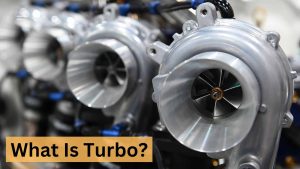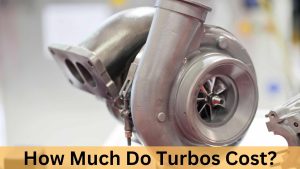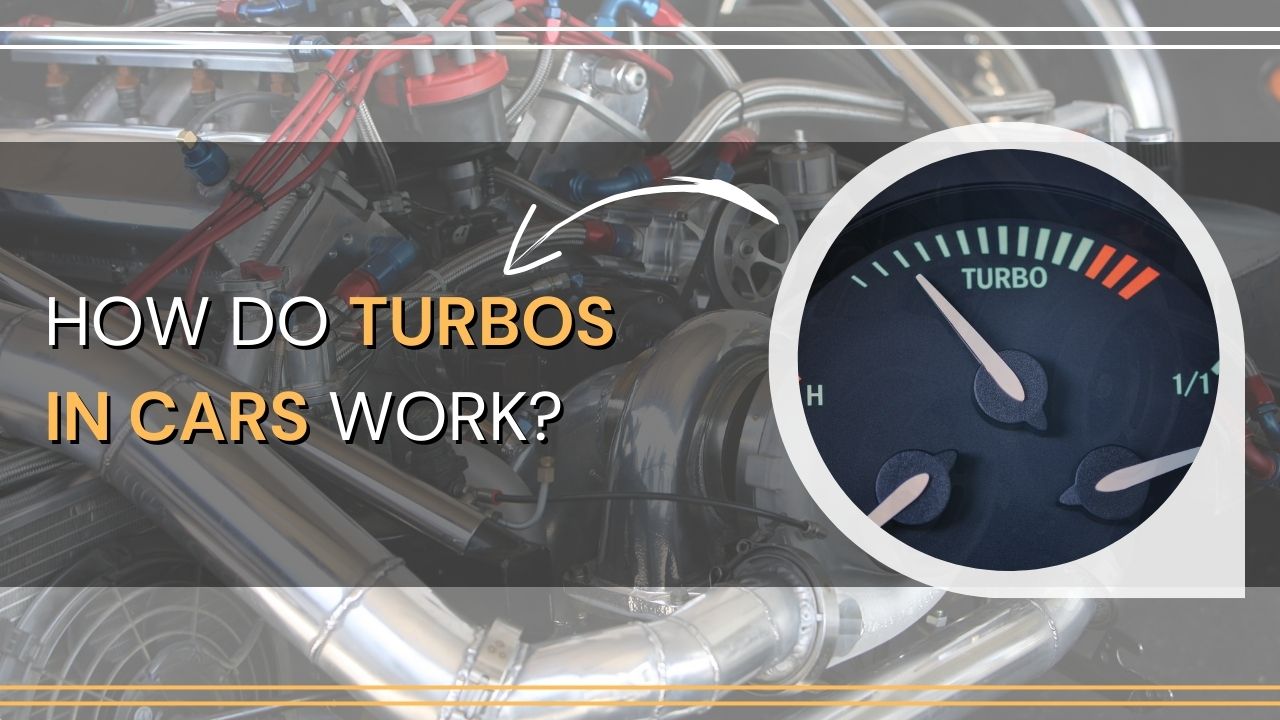Do you know how turbos work in a car? Have you ever witnessed the use of turbos producing more power into the engine? Unexpectedly, a turbo can increase an engine’s horsepower by 30–40%, or roughly 70–150 HP.
Getting the turbo built will help you get the most out of your car if you ever go to a car shop with that intention. The workshop will install a turbo kit specifically designed for your make and model of car, and they will diagnose your car engine also tune your it to ensure that it is running at its peak performance. After the installation, they will take your car out for a test drive to ensure everything is working correctly.
Turbos in cars work by using the exhaust gas from the engine to power a turbine. Compressors force air into the engine through the turbine. It allows the engine to burn more fuel, which increases power. Turbos are typically used to increase power and performance in the car.
This blog will deal with what a Turbo is and how it can boost your car to give you an optimal performance. If you are interested in getting a turbocharger for your car or have any questions about how they work, you should visit a car repair garage or call a mobile mechanic soon.
What is a Turbo?

As we mentioned earlier, a turbo forces more air into the engine by injecting more fuel into the system. Increasing the strength of the combustion and producing more power into the same.
A turbocharger is propelled by the engine’s exhaust gases and consists of a turbine and a compressor on a single shaft. As the gases flow through the turbine, they spin the turbine blades, which spin the compressor. The compressor pressurizes air coming into the engine, forcing more air into the cylinders. That means more fuel can be burned, which increases power.
A turbocharger can increase power by as much as 30 percent in some engines. And because it uses exhaust gasses that would otherwise be wasted, it’s considered a very efficient way to increase power. A turbocharger ensures there is always enough air supply for the engine. The turbocharger forces more air into the combustion chamber by compressing air that enters the engine. This allows the engine to burn more fuel, which results in more power.
Turbochargers are often used on diesel engines which are designed to run at a higher compression ratio than gasoline engines. That means they can take advantage of a turbocharger’s increase air pressure. But turbo kits are also used on some gasoline engines, particularly high-performance ones.
Because a turbocharger increases the amount of air going into the engine, it also increases the amount of heat. It must cool the air before entering the cylinders to prevent engine damage. Turbochargers are often cooled with an intercooler, which looks like a radiator.
In addition to providing more power, turbochargers can also improve fuel economy. They make it possible to downsize an engine without sacrificing power. Turbocharged engines are often found in cars designed for performance, such as sports and luxury vehicles. But they’re also becoming increasingly common in mainstream cars and trucks. Many new vehicles now offer car engine as an option, and some even have them as standard equipment.
How do Turbos in Cars Work?
A turbocharger is an air compressor driven by the engine’s exhaust gases. The turbocharger compresses the air entering the engine, resulting in a denser air-fuel mixture. It allows the mixture to burn more thoroughly, increasing the engine’s power output.
A supercharger is also an air compressor, but it is driven by the engine’s crankshaft instead of the exhaust gases. Superchargers are less efficient than turbochargers, but they provide a power boost without increasing exhaust emissions.
The main benefit of a turbocharger is that it allows an engine to produce more power without increasing size. The turbocharger can force more air into the combustion chamber than possible with atmospheric pressure alone. The other benefit is that it improves fuel economy by allowing the engine to run at lower speeds while still providing the power needed for acceleration.
Turbochargers are most commonly found in diesel engines, as they can make most of the high-pressure environment created by the engine. However, they are also used in petrol engines and have become increasingly popular in performance cars.
The main disadvantage of a turbocharger is that it can result in increased engine noise, as exhaust gases power the turbine. It can be particularly noticeable when the engine is under load, such as when accelerating.
Turbocharged engines are typically more expensive to maintain than non-turbocharged engines, as the turbocharger is an additional component that can require regular servicing.
Overall, a turbocharger is beneficial to an engine, as it can produce more power without increasing size. It provides high power output and is more fuel efficient as it increases the volumetric efficiency of the engine by forcing more air into the combustion chamber. Turbochargers also have certain drawbacks. For instance, they can make the engine noisier and hotter. They can also add weight to the vehicle and require extra maintenance and regular engine diagnosis.
How Much Horsepower do Turbos In Cars Add?

Turbo chips can add a significant amount of horsepower to your engine, but it is essential to know how much they add before you install one. Many people believe that turbos in cars add 100 horsepower or more, but the reality is that most turbos only add about 10-20 horsepower.
It is still a significant increase, especially if you have a smaller engine, but it is essential to know that you will not be getting the massive power increase that some people claim.
There are a few ways to increase the horsepower your turbocharged engine produces, but most of them come at the expense of increased wear and tear on your engine.
The first way to get more power out of your turbo is to increase the boost. It can be done by turning up the boost pressure or installing a larger turbocharger. Both of these methods will increase the amount of air that is forced into the engine, which will, in turn, increase the power output.
The second way to get more power from your turbo chips is to increase the size of the turbine. It will increase the amount of exhaust gas that is flowing through the turbo, which will, in turn, increase the power output. However, this method will also increase the stress on your engine and can lead to increased wear and tear. Be sure to talk to your mechanic to see if this is the right direction for you to take.
The third way to get more power from your turbo is to increase the turbine’s efficiency. Using a higher-efficiency turbine or installing a bigger compressor wheel can accomplish this. Both of these methods will increase the amount of power your turbo produces and the stress on your engine. Having a more efficient turbo means that it can work at a higher pressure and temperature, which will lead to increased power.
If you want to get more power from your turbo, you need to increase the size of your turbocharger. This will give you more airflow and will also increase the size of your compressor wheel. If you want to go with a bigger turbo, you need to make sure that you have the right size engine to support it. If you don’t, you could end up damaging your engine.
While this might not seem like a lot, it can make a big difference on the track or on the street. Most turbos will also improve your engine’s efficiency, which can lead to better fuel economy. If you are looking for a way to add a little extra power to your engine, then a turbocharger is a great option. Just be sure to do your research and choose a reputable brand to avoid any issues.
Installing a turbocharger is a great way to increase your engine’s power, but it is essential to know how much horsepower they add. It is essential to consult a professional as they can advise you on what is safe for your engine. Adding a turbocharger to your engine can give it a significant power boost. However, it is essential to make sure you are not overloading your engine by doing so. Always consult with a professional before increasing the turbine’s efficiency to ensure you are not doing more harm than good.
How Much do Turbos In Cars Cost?

Turbos in Cars are one of the most popular modifications, especially among those who want to improve performance. But how much do turbos cost?
The cost of a turbocharger can vary depending on several factors, such as the type of turbo, the make and model of your car, and the installation process. However, you can expect to pay anywhere from $500 to $5000 for a quality turbocharger.
Several types of turbos are available in the market, each with its own set of pros and cons. For example, a single turbocharger is typically less expensive than a twin turbocharger but may provide less power.
Turbo kit prices can also vary depending on the make and model of your car. In general, however, you can expect to pay anywhere from $1000 to $5000 for a quality turbo kit.
The installation process is another factor that can affect the cost of a turbocharger. If you are comfortable working on your car, install the turbocharger yourself. However, if you are uncomfortable working on your car, you may need to find an expert car mechanic or you can also call mobile mechanics.
In general, the cost of a turbocharger will vary depending on the factors mentioned above. However, if you shop around and negotiate enough, you should be able to find a quality turbocharger for a reasonable price. Thus, it is important to do your research before making a purchase.
Conclusion
We’ve mentioned the details about the Turbo and how it can help you enhance the performance and horsepower of your car.
This turbo guide can be highly beneficial for anyone looking to purchase a turbocharger or looking to upgrade their current turbocharger. By providing you with all of the necessary information regarding turbos, we hope you can make an informed decision about which turbocharger is right for you.
By having a guide to turbos, you will be able to properly maintain your turbocharger so that it will last for many years to come.
Whether you are looking for information on the installation of a new turbocharger or just want to learn more about how turbos work, the Mobile Mechanic, Perth team can help.For more information, visit a workshop, or call a mobile mechanic, or ask your dealer to provide you information on the same.
